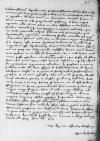Letter #618
Conradus GOCLENIUS (WACKERS) to Ioannes DANTISCUSLeuven (Lovanium), 1531-04-27
| received Ghent (Gandavum), 1531-04-29 Manuscript sources:
Auxiliary sources:
Prints:
| ||||||||||||||||||||||||
Text & apparatus & commentary Plain text Text & commentary Text & apparatus
Reverendissimo domino
Salutem plurimam.
Equidem inter praecipuos felicitatis calculos illud mihi numerandum duco, quod ita sors tulerit, ut licuerit propius intueri ac cognoscere illum uno omnium ore decantatum Dantiscum. In qua re plane evenit, ut mihi quoque dicendum existimem: O fama ingens ingentior actis. Id cum ceteris in rebus disciplinis ac virtutibus praeclare animadverti tum praecipue in comitate civilis vitae, qua, cum tanto intervallo reliquos caesareae aulae proceres, sive quis dignitatem sive ingenium sive eruditionem spectet, antecellas, ita tamen ad humiliorum fortunam accommodas, ut illos potius erigere ad ampliora quam te deicere infra tantam dignitatem videaris, ut in nullo umquam magis verum esse deprehenderim, omnia viros bonos decere. Ceterum cum me quoque non dedignatus sis amplissimo honore tuorum clientum, tanta praeterea in me usus sis humanitate, ut a nullo veteri amico maior possit exspectari, admodum cupio dari occasionem, qua possim tibi fidem facere, hunc animum totum nihil perinde desiderare, quam tibi aliquod suae gratitudinis argumentum ostendere. In praesentia in eius rei symbolum mitto tibi dono effigiem domini
Tuae Reverendissimae Celsitudini deditissimus

